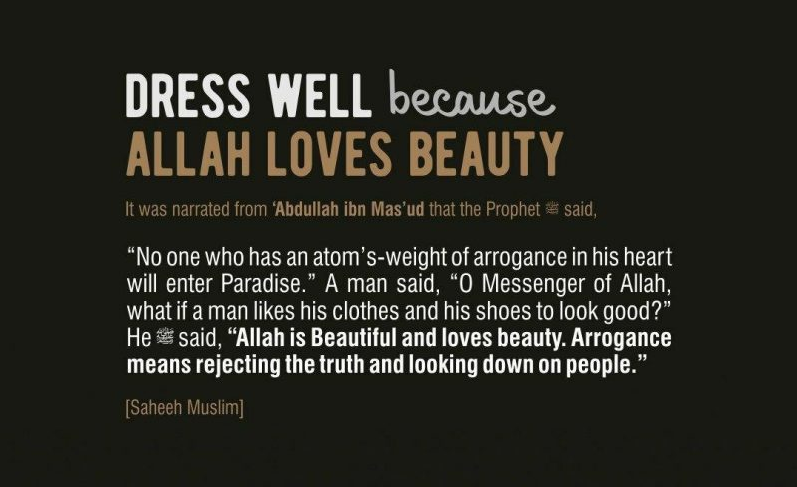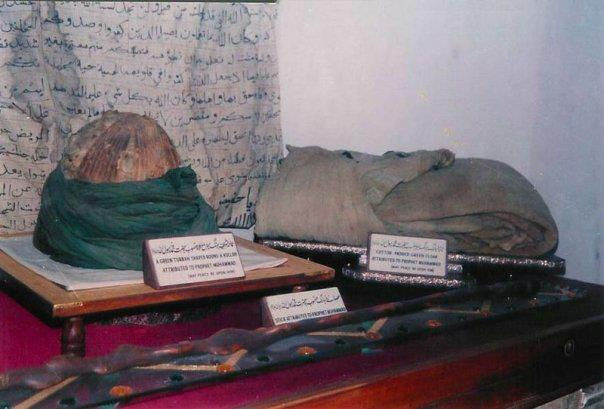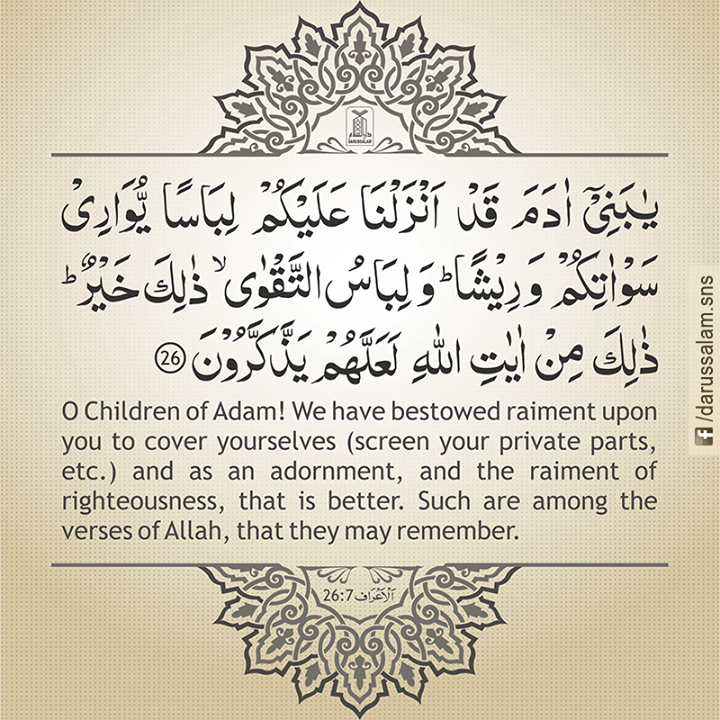The prophet's guidance regarding clothes
- Al-Mohsinun

- Apr 11, 2021
- 5 min read
Muslims are required to pay attention to their appearance, making sure that their clothing is beautiful and clean, especially when dealing with others and when performing the prayers, as the Qur’an states, “O Children of Adam! Dress properly whenever you are at worship.” (Surah Al-A‛raaf, 7:31)

Subhan Allahil Azeem, Allah (swt) has permitted people to wear nice clothes and put on a good appearance, as doing so is one aspect of remembering Allah’s blessings upon them. Allah says in the Quran:
قُلۡ مَنۡ حَرَّمَ زِيۡنَةَ اللّٰهِ الَّتِىۡۤ اَخۡرَجَ لِعِبَادِهٖ وَالطَّيِّبٰتِ مِنَ الرِّزۡقِؕ قُلۡ هِىَ لِلَّذِيۡنَ اٰمَنُوۡا فِى الۡحَيٰوةِ الدُّنۡيَا خَالِصَةً يَّوۡمَ الۡقِيٰمَةِؕ كَذٰلِكَ نُفَصِّلُ الۡاٰيٰتِ لِقَوۡمٍ يَّعۡلَمُوۡنَ
"Say (O Muhammad): 'Who has forbidden the adornment which Allah has brought forth for His creatures or the good things from among the means of sustenance?' Say: 'These are for the enjoyment of the believers in this world, and shall be exclusively theirs on the Day of Resurrection.' Thus do We clearly expound Our revelations for those who have knowledge. (Surah Al-A‛raaf 7:32)
وَاللّٰهُ جَعَلَ لَـكُمۡ مِّمَّا خَلَقَ ظِلٰلًا وَّجَعَلَ لَـكُمۡ مِّنَ الۡجِبَالِ اَكۡنَانًا وَّجَعَلَ لَـكُمۡ سَرَابِيۡلَ تَقِيۡكُمُ الۡحَـرَّ وَسَرَابِيۡلَ تَقِيۡكُمۡ بَاۡسَكُمۡؕ كَذٰلِكَ يُتِمُّ نِعۡمَتَهٗ عَلَيۡكُمۡ لَعَلَّكُمۡ تُسۡلِمُوۡنَ
And Allah has provided shade for you out of some of the things He has created; and He has provided you with shelters in the mountains, and has given you coats that protect you from heat as well as coats that protect you in battle. Thus does He complete His favour upon you that you may submit to Him. (Surah 16:81)
The Prophet's guidance regarding clothes was the best guidance, the most beneficial for the body and the easiest to wear and take off.
The Prophet used to wear an outer garment and Izar (which covered the body), as these types of clothes are the softest on the body.
The Prophet (pbuh) also liked to wear shirts, which was preferred by him.
What the Prophet (pbuh) used to wear was the most beneficial for the body, as his clothes did not have excessively long or wide sleeves. Rather, the sleeves were to the wrists and would not be longer than the hand, as this would make them harder to wear and to move about easily.
Further, the sleeves were not shorter than what we have described, so as not to expose the hands to the cold and heat.
In addition, the Prophet's shirts and garments did not reach the ankles and would usually reach the middle of his legs.
Otherwise, if the clothes were longer, they will restrict the movement and make one feel restrained. They were not shorter than what we have described, so as not to expose the thighs to the heat and cold.

The Prophet's turban was not excessively big so that it did not harm the head. It was not very small either, otherwise it would not be sufficient to protect the head from the heat and cold. It was medium in size, and he used to pass a part of it under his chin to protect the neck from the heat and cold and to keep the turban firmly on the head when riding his horse or camel and when in battle.
Many people use some type of braces instead of passing the turban under the chin, although the two methods cannot be compared in terms of benefit or even beauty.
When one thinks about the types of clothes that the Prophet used, he will find that they are indeed among the best for the body and health and the farthest from extravagance and difficulty to wear.
Most of the time, the Prophet (pbuh) used to wear Khuffs (socks) while traveling, because the feet would need such types of foot covering to fend off the effects of the heat and cold. Sometimes, he would use the Khuffs when he was not traveling.
The best colors that the Prophet used to wear were white and striped garments. He did not wear all red, black or dyed garments. As for the red garment the Prophet (pbuh) was reported to have worn, it was Yemeni garment that had black, red, and white stripes. We have mentioned this before and stated that some people erred when they thought that the Prophet (pbuh) wore red garments.

Forbidden Types of Clothing
Clothing that reveals the private parts
Clothing that involves dressing like or imitating the opposite sex
Clothing that involves imitation of the dress traditionally worn by non-Muslims
Clothing that is worn with pride and conceit
Silk clothing or clothing adorned with gold or silk for men
Extravagant clothing
Religion Islam has a dress code for both women and men. The purpose of defining the dress code is to protect society as a whole and promote modest dressing and behavior. The Quran and Sunnah have laid down certain principles regarding the dress code of both males and females. Muslim men and women are required to observe the Islamic teachings both internally and externally. Allah (SWT) says in the Quran:
وَذَرُوۡا ظَاهِرَ الۡاِثۡمِ وَبَاطِنَهٗؕ اِنَّ الَّذِيۡنَ یَکْسِبُوۡنَ الۡاِثۡمَ سَيُجۡزَوۡنَ بِمَا كَانُوۡا يَقۡتَرِفُوۡنَ
"Abstain from sin, be it either open or secret. Indeed those who commit sins shall surely be requited for all they have done". (Surah 6:120)
The Islamic way of dressing is a Divine Command and is necessary in the best interest of the society of every age and place. Almighty Allah says in the Holy Quran:
قُلْ لِّـلۡمُؤۡمِنِيۡنَ يَغُـضُّوۡا مِنۡ اَبۡصَارِهِمۡ وَيَحۡفَظُوۡا فُرُوۡجَهُمۡ ؕ ذٰ لِكَ اَزۡكٰى لَهُمۡ ؕ اِنَّ اللّٰهَ خَبِيۡرٌۢ بِمَا يَصۡنَـعُوۡنَ
(O Prophet), enjoin believing men to cast down their looks and guard their private parts.30 That is purer for them. Surely Allah is well aware of all what they do. (Surah 24:30)
وَقُلْ لِّـلۡمُؤۡمِنٰتِ يَغۡضُضۡنَ مِنۡ اَبۡصَارِهِنَّ وَيَحۡفَظۡنَ فُرُوۡجَهُنَّ وَلَا يُبۡدِيۡنَ زِيۡنَتَهُنَّ اِلَّا مَا ظَهَرَ مِنۡهَا وَلۡيَـضۡرِبۡنَ بِخُمُرِهِنَّ عَلٰى جُيُوۡبِهِنَّ- وَلَا يُبۡدِيۡنَ زِيۡنَتَهُنَّ اِلَّا لِبُعُوۡلَتِهِنَّ اَوۡ اٰبَآئِهِنَّ اَوۡ اٰبَآءِ بُعُوۡلَتِهِنَّ اَوۡ اَبۡنَآئِهِنَّ اَوۡ اَبۡنَآءِ بُعُوۡلَتِهِنَّ اَوۡ اِخۡوَانِهِنَّ اَوۡ بَنِىۡۤ اِخۡوَانِهِنَّ اَوۡ بَنِىۡۤ اَخَوٰتِهِنَّ اَوۡ نِسَآئِهِنَّ اَوۡ مَا مَلَـكَتۡ اَيۡمَانُهُنَّ اَوِ التّٰبِعِيۡنَ غَيۡرِ اُولِى الۡاِرۡبَةِ مِنَ الرِّجَالِ اَوِ الطِّفۡلِ الَّذِيۡنَ لَمۡ يَظۡهَرُوۡا عَلٰى عَوۡرٰتِ النِّسَآءِ- وَلَا يَضۡرِبۡنَ بِاَرۡجُلِهِنَّ لِيُـعۡلَمَ مَا يُخۡفِيۡنَ مِنۡ زِيۡنَتِهِنَّ ؕ وَتُوۡبُوۡۤا اِلَى اللّٰهِ جَمِيۡعًا اَيُّهَ الۡمُؤۡمِنُوۡنَ لَعَلَّكُمۡ تُفۡلِحُوۡنَ
And enjoin believing women to cast down their looks and guard their private parts and not reveal their adornment34 except that which is revealed of itself, and to draw their veils over their bosoms, and not to reveal their adornment save to their husbands, or their fathers, or the fathers of their husbands, or of their own sons, or the sons of their husbands, or their brothers, or the sons of their brothers, or the sons of their sisters, or the women with whom they associate, or those that are in their bondage, or the male attendants in their service free of sexual interest, or boys that are yet unaware of illicit matters pertaining to women. Nor should they stamp their feet on the ground in such manner that their hidden ornament becomes revealed. Believers, turn together, all of you, to Allah in repentance that you may attain true success. (Surah 24:31)
It should be carefully noted that the demands that divine law makes from women are not only those it has made from men, that is restraining of looks and guarding of the private parts, but it makes some other demands from them also, which it has not made from men. This shows that men and women are not identical in this respect.
Rest Allah knows best.
Source: Quran, Sunnah, Islam QA, Healing With The Medicine of Prophet (Peace & Blessings of Allah be Upon Him). By: Imam Ibn Al-Qayyim Al Jauziyyah. Translated By: Jalal Abu Al Rub. Note: Visit the website for in-depth information:
https://www.newmuslimguide.com/en/your-dress-code/108







Comments